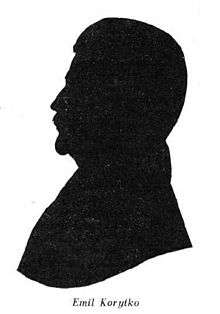Emil Korytko
Emil Antoni Korytko (7 September 1813 – 31 January 1839) was a Polish political activist in the period of the Great Emigration, who was exiled to Ljubljana, Carniola (now Slovenia) and became an important ethnographer, philologist and translator there.[1] His legacy are collections of Slovene folk songs and vivid descriptions of Carniolan folk customs. He significantly contributed to the mutual dialogue between Polish and Slovene authors and readers.

Early life and study
Born in Zhezhava (now Zelenyi Hai, Zalishchyky Raion[2]) or Lviv in Austrian Galicia (now in the Ternopil Oblast in Ukraine), since 1832 he studied philosophy and philology at the University of Lwow. He participated in the November Uprising. In 1834, he was arrested by the Austrian authorities in Lviv on accusations of having participated in underground subversive activities, and in 1836 sent into confinement to Ljubljana, Duchy of Carniola (now in Slovenia), together with Bogusław Horodyński, where they arrived in late January 1837.[3]
Exile into Ljubljana
.jpg)
In Ljubljana, Korytko became a close collaborator of the Slovene national Romantic circle. He became a personal friend of the Slovene poet France Prešeren,[4] and helped him translate several poems by Adam Mickiewicz into German. He also translated some of Prešeren's poems into German.[5] He studied Slovene folk songs from Carniola, which he published in five volumes, and Carniolan folk customs. He prompted the painter Franz Kurz zum Turn und Goldenstein to paint 70 portraits of people in different folk costumes.[6]
Korytko died in Ljubljana due to typhus, and was buried at Navje (then St. Christopher Cemetery) in Bežigrad District.[7] His funeral was one of the first public manifestations of Slovene patriotism. Among the young Slovene patriots who were chosen to carry Korytko's coffin was Karel Dežman.
Commemoration
In November 2013, the celebration of 200th anniversary of Korytko's birth was held in Ljubljana, organised by the Polish Embassy and the University of Ljubljana. An exhibition has been held in the National and University Library of Slovenia since 7 November, and a commemorative postage stamp was issued.[8]
References
- "V vzhodni Galiciji na Poljskem se je rodil etnograf Emil Korytko | Zgodovinsko društvo dr. Franca Kovačiča v Mariboru". Zgodovinsko-drustvo-kovacic.si. Retrieved 2013-11-12.
- (in Ukrainian) І. Дубецький, В. Олійник, Коритко Еміль Станіславович // Ternopil Encyclopedic Dictionary: in 4 v. / editorial board: H. Yavorskyi and other, Ternopil: "Zbruch", 2005, V. 2: К—О, S. 176. — ISBN 966-528-199-2.
- Leeming, Henry (1982). "Zapostavljan poljski slavist: Emil Korytko (1813–1839)" [The Neglected Polish Slavicist: Emil Korytko (1813–1839)]. Slavistična revija: časopis za jezikoslovje in literarne vede (in Slovenian). 30 (1). Slavistično društvo Slovenije [Slavic Society of Slovenia]. pp. 1–26.
- "France Prešeren : Časovni trak". Preseren.net. Archived from the original on 2013-11-11. Retrieved 2013-11-12.
- "Skozi cas". Rtvslo.si. Archived from the original on 2013-11-11. Retrieved 2013-11-12.
- Grafenauer, Ivan (1925–1991). "Korytko Emil". Slovenski biografski leksikon (in Slovenian). Ljubljana: Slovenian Academy of Sciences and Arts. Archived from the original on 2012-03-31. Retrieved 2013-11-11.
- "Tednik Demokracija | novice, blogi, komentarji, članki". Demokracija.si. Retrieved 2013-11-12.
- Kolšek, Petra (11 November 2013). "Emil Korytko, poljski pregnanec v Ljubljani" [Emil Korytko, the Polish Exile in Ljubljana]. Delo.si (in Slovenian).
External links
| Wikimedia Commons has media related to Emil Korytko. |